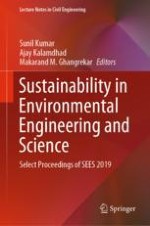2021 | OriginalPaper | Buchkapitel
Eco-efficiency Tool for Urban Solid Waste Management System: A Case Study of Mumbai, India
verfasst von : Ekta Singh, Aman Kumar, Rahul Mishra, Sunil Kumar
Erschienen in: Sustainability in Environmental Engineering and Science
Verlag: Springer Singapore
Aktivieren Sie unsere intelligente Suche, um passende Fachinhalte oder Patente zu finden.
Wählen Sie Textabschnitte aus um mit Künstlicher Intelligenz passenden Patente zu finden. powered by
Markieren Sie Textabschnitte, um KI-gestützt weitere passende Inhalte zu finden. powered by
